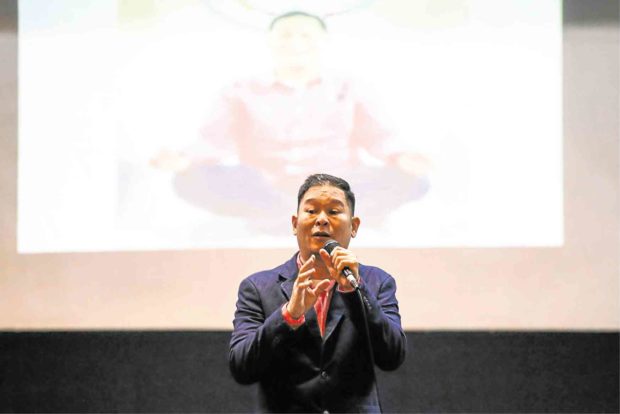UP freshmen laugh the blues away

Credit to Author: besguerra| Date: Sun, 11 Aug 2019 21:01:41 +0000
MANILA, Philippines — As the University of the Philippines’ College of Music (UPCM) in Diliman, Quezon City, welcomed its new batch of students last week, Abelardo Hall Auditorium was filled not with the sound of singing voices or musical instruments, but with melodious laughter meant to ease depression.
Some 28 years ago, Pinoy Laughter Yoga (PLY) founder Paolo Trinidad said that he, too, found himself at the crossroads as a UPCM student.
In the 2000 film “Castaway,” Tom Hanks’ character experienced mental turmoil when he was stranded on an island for over four years. Likening himself to Hanks’ character, Trinidad said he had to deal with existential dilemma and waves of grief that made his academic life a struggle.
He later gave up his dream of becoming a baritone and transferred to the UP College of Arts and Letters where he took up Philippine Studies.
Now aged 49, Trinidad returned on Tuesday to the college he had always treated as home, bringing with him a new instrument — his PLY initiative that he launched eight years ago to help heal people dealing with trauma and depression.
“Your situation now is very similar to what I experienced then, and it was difficult. I myself have clinical depression and I am still a work in progress,” Trinidad told UPCM students, professors and personnel.
At UP Diliman, officials have put interventions in place to help students dealing with the pressures of college life.
In 2017, the state university established the Psychosocial Services to cater to students who were suffering from anxiety and depression and “had nowhere else to go.”
Diaphragmatic laughter
In a previous interview, Trinidad said that PLY promoted “diaphragmatic” laughter as a way to relax, improve one’s mood and boost the immune system.
Through a series of PLY exercises, the levels of serotonin — a chemical believed to be linked to mood balance — become elevated. Low serotonin levels are said to lead to depression.
Propelled by his “advocacy for the nation,” Trinidad has traveled to many provinces to spread his unique therapeutic method.
He has dealt with survivors of the Zamboanga siege and Marawi armed conflict; “tokhang” survivors and their relatives in Caloocan City; and Supertyphoon “Yolanda” (international name: Haiyan) victims in Leyte trying to cope with the loss of lives and property.
College students, he said, were especially prone to clinical depression because of the constant mental strain and emotional challenges they face.
“When we use PLY to help treat clinical depression, we incorporate a psychoeducational part. And it has to be experiential,” he told the Inquirer.
“Since we started [PLY] in jails, we have been receiving evidence-based studies that it really lessens clinical depression,” he added.
After being trained by Dr. Madan Kataria of India, the founder and originator of the worldwide Laughter Yoga movement, Trinidad said he had to adjust it to the Philippine setting, where a grassroots approach and needs assessment must be initiated depending on the group’s context.
With PLY, 20 seconds of laughter is equivalent to three to five minutes of working out, helping prevent or ease depression, according to him.
“Even fake laughter is still a form of laughter,” he said.
Armed with cymbals, drums and images projected on a screen, Trinidad helped UPCM students find the “sound of the body” through a 45-minute laughter exercise.
During his PLY session, he asked his audience to find the sound of their bodies by chanting, tapping their hearts, copying facial expressions and stretching their arms at varying intensities. He also taught them the proper way to smile using the right muscles.
Bad energies
These exercises, Trinidad said, were akin to throwing out bad energies that might dominate the mind.
“Here in UP, we have the ‘Utak at Puso’ (mind and heart) mantra, but often the ‘utak’ is more overused,” he observed.
While laughter was his primary tool, Trinidad said that mental health problems were still no laughing matter.
“Imagine being sad 24/7. I’ve experienced sadness for two straight weeks; I wasn’t eating, taking a bath; there were visual and auditory hallucinations,” he recalled.
Depression and anxiety were issues that must be approached with appropriate interventions, he said, adding: “Suicide is not a laughing matter. It is a cry for help.”
According to him, he will never forget the stories of grief shared by tokhang victims, especially orphaned children, who have to keep on living despite witnessing extremely violent episodes.
But with every smile, laughter and cheer that he draws from every audience, Trinidad said he believed that one day, laughter yoga would eventually “heal a wounded nation.”